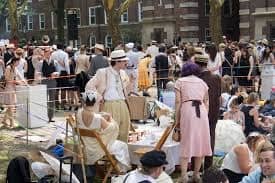
Almost a Century Later, the Allure of the Roaring 20s Lives On: 14th Annual Jazz Age Lawn Party
If you, like Daisy Buchanan, find large parties intimate, consider the 14th Annual Jazz Age Lawn Party. Celebrate the zeitgeist of the 1920s in all its glistening grandeur on Governors Island June 15-16 and August 24-25. The event is escapism twice over: cloistered on an island steeped in history, bustling with the devilish details of the Forgotten Decade. Whatever lives party goers lead across the East River are shed in exchange for drop waist beaded numbers and dapper suspenders. While costumes aren’t required, (and available for rent) a willingness to surrender to founder Michael Arenella’s steamy fever dream is.
The event attracts an earnest, light-hearted crowd, bursting with nostalgia. There’s a pie eating contest, a vintage portrait studio, croquet, even. But most importantly, there’s jazz. And what good is any daydream without a proper score? The howling of trumpets and crooning of the iconic lyrics of the decade animate the weekend, resurrecting the true spirit of the Jazz Age. Aperol Spritzes flow. Blankets are kicked up by the wind, fluttering into tiny islands of partygoers.

The Charleston is danced while the parasols are spread under the unrelenting summer sun. This year’s later hours (extended to 6 pm) boast reduced ticket prices and drink specials. But just like every year before, Michael Arenella & His Dreamland Orchestra can be expected to transport attendees.
The optimism and rebellious glint in the eye characteristic of the era run through every inch of the production. What made the 20s unsustainable makes the infamous Jazz Age Lawn Party unforgettable. A march into the sunset as the weekend’s grand finale, reminiscence of a Southern burial march, signifies the waking that comes with even the most visceral of dreaming. From the soft pink skies drifting past the Manhattan skyline, under the mesmerizing spell of jazz and libations, it’s easy to understand how even Gatsby himself could feel “within and without, simultaneously enchanted and repelled by the inexhaustible variety of life,” at the Jazz Age Lawn Party.









